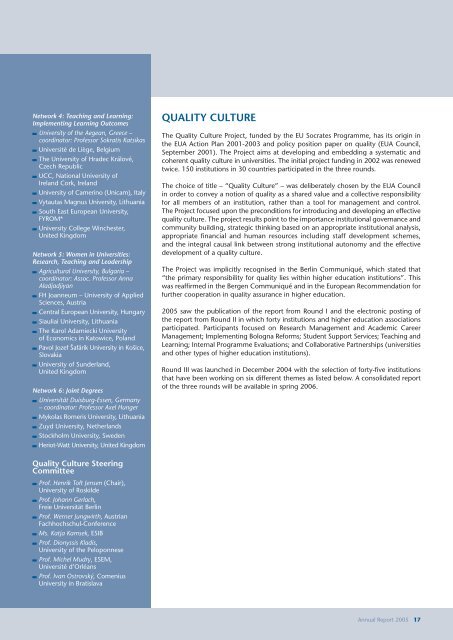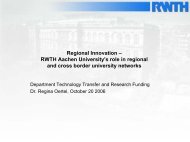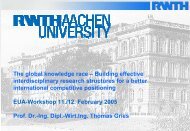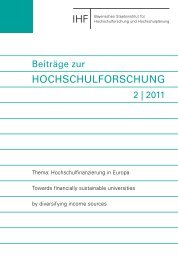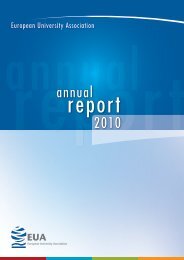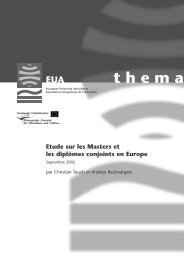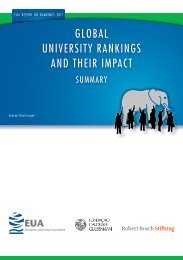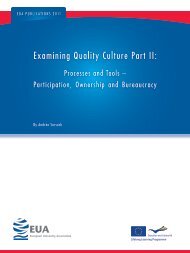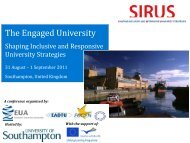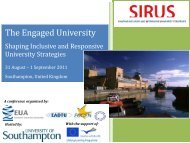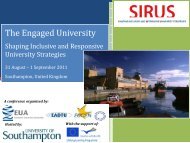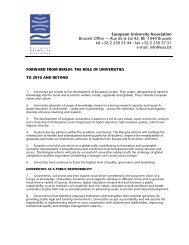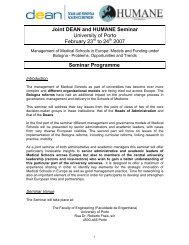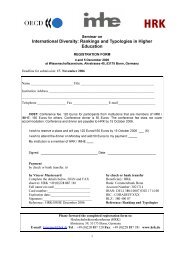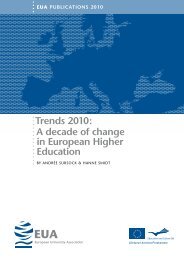English - European University Association
English - European University Association
English - European University Association
You also want an ePaper? Increase the reach of your titles
YUMPU automatically turns print PDFs into web optimized ePapers that Google loves.
Network 4: Teaching and Learning:<br />
Implementing Learning Outcomes<br />
<strong>University</strong> of the Aegean, Greece –<br />
coordinator: Professor Sokratis Katsikas<br />
Université de Liège, Belgium<br />
The <strong>University</strong> of Hradec Králové,<br />
Czech Republic<br />
UCC, National <strong>University</strong> of<br />
Ireland Cork, Ireland<br />
<strong>University</strong> of Camerino (Unicam), Italy<br />
Vytautas Magnus <strong>University</strong>, Lithuania<br />
South East <strong>European</strong> <strong>University</strong>,<br />
FYROM*<br />
<strong>University</strong> College Winchester,<br />
United Kingdom<br />
Network 5: Women in Universities:<br />
Research, Teaching and Leadership<br />
Agricultural <strong>University</strong>, Bulgaria –<br />
coordinator: Assoc. Professor Anna<br />
Aladjadjiyan<br />
FH Joanneum – <strong>University</strong> of Applied<br />
Sciences, Austria<br />
Central <strong>European</strong> <strong>University</strong>, Hungary<br />
Siauliai <strong>University</strong>, Lithuania<br />
The Karol Adamiecki <strong>University</strong><br />
of Economics in Katowice, Poland<br />
Pavol Jozef Šafárik <strong>University</strong> in Košice,<br />
Slovakia<br />
<strong>University</strong> of Sunderland,<br />
United Kingdom<br />
Network 6: Joint Degrees<br />
Universität Duisburg-Essen, Germany<br />
– coordinator: Professor Axel Hunger<br />
Mykolas Romeris <strong>University</strong>, Lithuania<br />
Zuyd <strong>University</strong>, Netherlands<br />
Stockholm <strong>University</strong>, Sweden<br />
Heriot-Watt <strong>University</strong>, United Kingdom<br />
Quality Culture Steering<br />
Committee<br />
Prof. Henrik Toft Jensen (Chair),<br />
<strong>University</strong> of Roskilde<br />
Prof. Johann Gerlach,<br />
Freie Universität Berlin<br />
Prof. Werner Jungwirth, Austrian<br />
Fachhochschul-Conference<br />
Ms. Katja Kamsek, ESIB<br />
Prof. Dionyssis Kladis,<br />
<strong>University</strong> of the Peloponnese<br />
Prof. Michel Mudry, ESEM,<br />
Université d’Orléans<br />
Prof. Ivan Ostrovský, Comenius<br />
<strong>University</strong> in Bratislava<br />
QUALITY CULTURE<br />
The Quality Culture Project, funded by the EU Socrates Programme, has its origin in<br />
the EUA Action Plan 2001-2003 and policy position paper on quality (EUA Council,<br />
September 2001). The Project aims at developing and embedding a systematic and<br />
coherent quality culture in universities. The initial project funding in 2002 was renewed<br />
twice. 150 institutions in 30 countries participated in the three rounds.<br />
The choice of title – “Quality Culture” – was deliberately chosen by the EUA Council<br />
in order to convey a notion of quality as a shared value and a collective responsibility<br />
for all members of an institution, rather than a tool for management and control.<br />
The Project focused upon the preconditions for introducing and developing an effective<br />
quality culture. The project results point to the importance institutional governance and<br />
community building, strategic thinking based on an appropriate institutional analysis,<br />
appropriate fi nancial and human resources including staff development schemes,<br />
and the integral causal link between strong institutional autonomy and the effective<br />
development of a quality culture.<br />
The Project was implicitly recognised in the Berlin Communiqué, which stated that<br />
“the primary responsibility for quality lies within higher education institutions”. This<br />
was reaffi rmed in the Bergen Communiqué and in the <strong>European</strong> Recommendation for<br />
further cooperation in quality assurance in higher education.<br />
2005 saw the publication of the report from Round I and the electronic posting of<br />
the report from Round II in which forty institutions and higher education associations<br />
participated. Participants focused on Research Management and Academic Career<br />
Management; Implementing Bologna Reforms; Student Support Services; Teaching and<br />
Learning; Internal Programme Evaluations; and Collaborative Partnerships (universities<br />
and other types of higher education institutions).<br />
Round III was launched in December 2004 with the selection of forty-fi ve institutions<br />
that have been working on six different themes as listed below. A consolidated report<br />
of the three rounds will be available in spring 2006.<br />
Annual Report 2005 17


